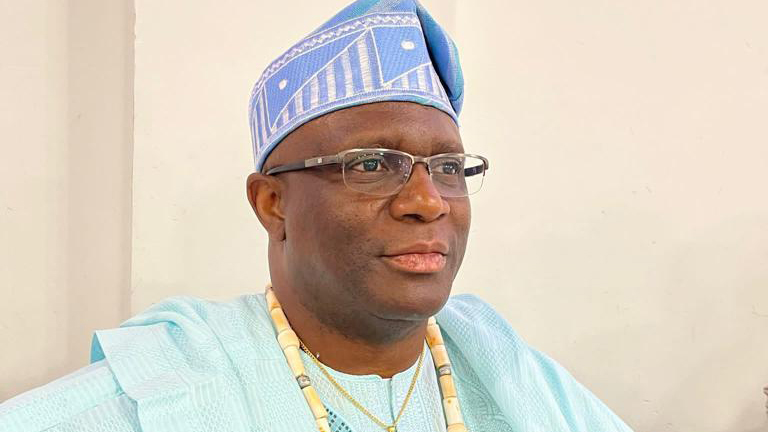 Adeshina[/c• Seeks Creation Of Ministry Of Local Government
Adeshina[/c• Seeks Creation Of Ministry Of Local Government
Empowerment at the grassroots has been identified as key to the assessment of the incoming Bola Ahmed Tinubu-led presidency and the 10th National Assembly.
Specifically, the success, or otherwise, of the incoming administration will be determined by its impact on the Nigerian Local Government system, Otunba Ade Adeshina told The Guardian in an interview on agenda setting for the administration set to be inaugurated in May 29 and aimed at meeting the yearnings of all Nigerians.
“Seek ye first the kingdom of the grassroots, and everything; security, economic prosperity and general well-being of the nation shall be added unto you,” said Adeshina, a United Kingdom-based expert in Local Government Administration and Director General of the Bola Tinubu Support Organisation (BTSO-UK).
To achieving what he calls Community Economic Regeneration and Development across the 774 Local Governments of Nigeria, Adeshina said that it was imperative to create a Federal Ministry of Local Government and Chieftaincy Affairs.
“This will be a federal point of reference and convergence for the 774 Local Governments of the federation in order to monitor the funding allocations of each LG and ensure that funds are effectively used for the purpose of rural regeneration and development,” he said.
In this light, Adeshina called for the establishment of a Special Community Economic Regeneration and Development team that will work with each local council.
According to him, the purpose of this is to Identify and develop specific needs-based projects and initiatives; identify the comparative advantage of each local council and harness this to ensure that each local council can develop at its own pace in line with the level of additional resources available locally and outside the Federal allocations.
Similarly, he said, this would ensure that value-for-money projects and initiatives were rolled out using local manpower and resources to ensure speedy economic regeneration and development within each local council.
“Let me add that this will also identify other external/international funding sources that will help drive economic development across the 774 LGs in Nigeria.
“It will create a bottom-up approach to economic regeneration and development; thus ensuring that the gains of democracy is felt speedily in the grassroots and rural areas, thereby turning villages into towns and cities within a short space of time,” he said.
Adeshina, who is an accomplished community leader, UK Immigration Adviser, Community Economic Regeneration Strategic Policy professional and consultant, is a Certified Automobile Engineer.
He is CEO of O”- Bay Community Trust – an organisation that has worked on a Pan-London basis for over three decades, on poverty eradication initiatives for poor and working-class families.
Since 1997, he has served as Local Education Authority (LEA) Governor in Primary and Secondary Schools as an Educationist across the London Borough of Enfield.
Adeshina said he was not bothered about the constitutional controversy that still trails the Local Government system in Nigeria. “It does not matter whether we see the Local Government as second or third third tier of governance in Nigeria,” he said.
What matters, according to him, is there is the need for efficient and sustainable governance at the grassroots. He said restructuring should start with breath of fresh air into the administration at the grassroots.
He said: “This is what is done in every progressive country, globally. Let us be clear about the establishment of a Special Community Economic Regeneration and Development, this is not a LG project to deliver, but the federal government.
“For example, in the UK, it is a special project that sits parallel within UK national department for LG and it is run by appointed local and regional community leaders and representatives while each Local Government provides infrastructural assistance and some officials, in some cases, but this establishment has its own offices and officers nationwide.
“This is done to ensure that the dividends of democracy get to the grassroots and the only way this can be accomplished is by creating a parallel paradigm discourse change team and agenda that work in all LG areas with a bespoke initiative subject to local people involvement, engagement and inclusion in the agenda development and control as well as carrying each LG along without interference in each other’s project delivery.
“In my capacity as chairman and delivery CEO across Upper Lea Valley in London (LEP & LAP), I have the blueprint of the structure, strategic plans and delivery/investment strategy.
“Some of the people who are Nigerians and among those that delivered as well as managed some aspects of the initiative within Upper Lea Valley (ULV) included Dr. Ken Ife, Alhaji Garba Sani and so on.
“In terms of the implementation aspects of this project, I cannot divulge it all at this stage openly.
“Meanwhile, service delivery, be it educational, health or infrastructure, are equally important aspects of this project, which had earned me an award for capabilities to ensure funder desire outcomes; hence, the reason I was singled out for an award by the UK Prime Minster in October 2009.
“The programme is still ongoing, and I am convinced of its importance to Nigeria at this critical stage when much is expected from the Tinubu-led government.
“Fortunately, the president-elect is high on democratic values, sustainable and impactful fiscal federalism and restructuring. His pioneer effort in the establishment of local development councils could only reinforce this confidence.”



